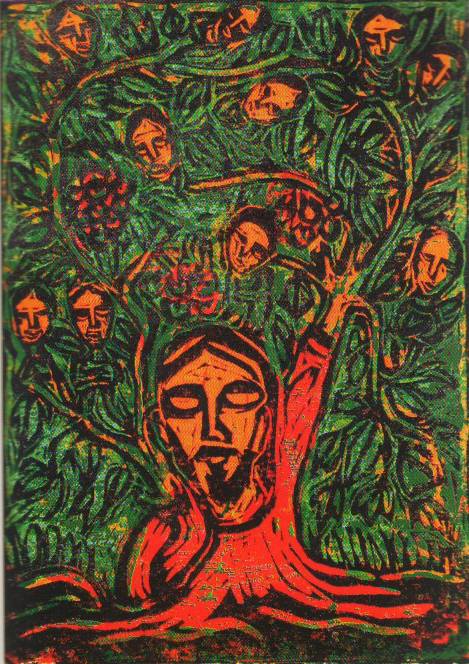Extremely mystical, Jesus gives a lyrical explanation of how we are connected to God and to each other. He uses everyday quotidian things and tasks to explain the spiritual truth that we are freed to live beyond the law, to live by an ethic of creativity, to know spiritual ecstasy and union with God in our lives. WAIT! Where did all that come from? Isn’t this simply a beautiful parable of how we are to live?
Jesus takes common experiences of everyday life and uses them as metaphors and allegories for faith. In a sense it’s almost as if talking about faith, union with God and spiritual truth is beyond words. It’s a limitless reality that we can only communicate in limited vocabulary. So Jesus talks of grape vines and how to care for them. As everyone then, and today some in Napa and Sonoma, knows you have to prune a grape vine twice to get the best results. In early Spring you cut off the non-fruit-bearing branches to focus the energy of the plant as it wakes from dormancy. Then later you clean off any secondary growth, that will only sap away energy better focused on the fruit already set and maturing on the vines. It’s Gardening 101, that serves as an entry into a discussion about deeper things.
In the ancient world a vine was a commonly used symbol. Throughout the First Testament we hear the vineyard as the common symbol for Israel. Some examples include: Isaiah 5:1-7; 27:2-6; Jeremiah 5:10; 12:10-11; Psalm 80:7-19; Ezekiel 15:6; 17:2-11. It’s also established in the Second Testament in Matthew 20:1-16; 21:28-32 and Luke 7:1-9. Jesus identifies himself as the vine – the true vine – of which all leaves, branches and fruit are a part. He isn’t the stalk, he’s the whole vine. Those that follow him, his disciples, God’s created people, are the branches which sprout from the vine. Their life is found only in the vine, the avenue for the life-giving sap. The branches are intended to bear fruit. That’s why you cut off the ones that don’t, in order to focus the energy of the sap in the ones that do. The purpose of the branches is to bear fruit – to eat, to drink, and to ferment in order to create wine – the drink of celebration and gratitude. It’s simple.
And yet is it? Is Jesus merely talking about doing good works? We follow his teachings. We are saved in that belief. We do good things to share his love. Or is it more than that? Or is it relational? Does it point to a different way of being in the world, with each other, in relationship to Christ? Jesus tells us that growth happens in connection to him. Life is only possible in relationship to him, as a branch only grows through the sap that flows along and through the vine. Life is one of commitment to each other, of reciprocity, of an ethic of creativity – we’re meant to create good works, not for ourselves, but as a way for the life of the vine to be manifested and known in the world. The pressure and intent to bear more fruit, binds us closer and tighter to the source of life: the vine. What we do in life is merely an extension, expression, incarnation of who Jesus is and how we are with him.
God, like any true gardener, wants life, fruit, abundance, multiplication of fruit. God desires for us to know spiritual ecstasy, to move beyond the limits of our humanity – or sinful nature – which traps, imprisons and stifles us. God wants us to know something which is greater than the sum of its parts, something we can only know if we remain in Jesus.
The ancient Greeks worship many gods, popular among them was Dionysus. He was understood as the god of the grape harvest, winemaking and wine, of ritual madness, fertility, theatre and religious ecstasy. He’s commonly dressed in a bassaris or fox-skin, symbolizing a new life. In the ancient Greek cities he was worshipped as the protector of those who do not belong to conventional society and thus symbolizes everything which is chaotic, dangerous and unexpected, everything which escapes human reason and which can only be attributed to the unforeseeable action of the gods. Worship of Dionysus was aimed at religious ecstasy through the consumption of wine. We might call it drunkenness, yet it’s a state that is other, beyond the limits of everyday life, seemingly closer to the other that we associate with the divine realm. The ancient Egyptian Church father Origen wrote ” the word of Jesus is like a vine which awakens in us the feeling of being inspired and fills us with a drunkness, not which is unreasonable or insane, but which is divine.”
Questions for going deeper:
1. What word grabs your attention in today’s selections?
2. How do you make decisions in your life? Do you make them and then integrate God into them? Or do they come from God?
3. How is Jesus different than Dionysus in terms of what they say and represent in terms of life, fertility/fecundity/fruitfulness and union with God through ecstasy? When have you experienced spiritual ecstasy in your life?
4. How is it hard for you, for us, in our culture, to remain in Christ as the source of life?
